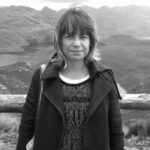Translator’s Note:
Siberia recounts the intimate experiences of a woman who loses a child shortly after his birth. As a work of autofiction, the narrative dwells on the effects of grief on the individual body while building connections with the landscape and surrounding environment of Buenos Aires, Quito, Guayaquil, and the Ecuadorian countryside. It is a story about how a body or landscape rebuilds itself after tragedy, after ruin, after heartbreak.
In her book Grieving: Dispatches from a Wounded Country (Feminist Press, 2020, my translation), Cristina Rivera Garza reflects on the political power of writing and communal grief, stating that: “As we write, as we work with language—the humblest and most powerful force available to us—we activate the potential of words, phrases, sentences. Writing as we grieve, grieving as we write: a practice able to create refuge from the open. Writing with others. Grieving like someone who takes refuge from the open. Grieving, which is always a radically different mode of writing.” I believe this novel, Siberia, engages with this exact kind of writing, using language to articulate this highly intimate experience of pain and loss to connect with other beings in search of relief and fellowship.
Daniela Alcívar Bellolio is part of a group of contemporary Ecuadorian writers—which includes Mónica Ojeda, María Fernanda Ampuero, and Gabriela Ponce Padilla—that are receiving increasing international interest because of the strength and innovation of their writing. These writers seem to be particularly drawn to writing about the body and violence in an effort to push back against the patriarchy. Whereas Ojeda, for example, deals more with questions of terror, Alcívar Bellolio is particularly interested in narrating the way pain and grieving is experienced in the body. Hers is a powerful and vulnerable voice and one deserving of an English-language readership.
This excerpt comes from about halfway into the book, soon after the death of the narrator’s baby and her return to Ecuador. It is representative of the narrative voice and articulates the geographic framework of the novel. A longer sample is available upon request.
—Sarah Booker
***
I’ve always wondered how long I would be able to tolerate being in a place like Siberia or the North Pole, or the South. I’m not thinking about the wide open or about survival skills in extreme climates, because I know that the simple prolonged loneliness in my living room already generates in me a limit to my energy that makes present some sort of idiotic and conceited proximity to death.
What I mean is the contemplation of that kind of landscape: extensive, infinite, white, uninhabited plains. Void of life, or pursuing life in this way that is so indifferent to everything. The world in its most inhuman version: when it’s sovereign to itself and no one modifies anything, just time. And even that’s relative. They’re called eternal snows for something, right? because they never change. And if they do change, no one notices. A white and alien extension that does not end, that no one plows, that will always be the same.
Siberia appears. In the field where I temporarily live until the house we began constructing for our son is inhabitable, I’ve gone out very early, at dawn, to walk the dog that I stole from the neighboring lot. They had him tied up day and night, regardless of the storms or the harsh sun that repeat every day without fail or variation. I heard him cry from afar, tirelessly, until I decided to spy, and there I saw him: beaten and already deformed from lying so long in the corner they gave him as his only place in the world. Then I turned around and went to see my dogs that were sleeping in my bed.
The daily ruckus of this field, generally dominated by the wind shaking the trees and numerous birds and roosters announcing the dawn, sometimes by the screams of a pig being killed, that chaotic ruckus that the bell ordains twice a day from the spotless church, white and home to one of the most famous virgins of this country, the Virgen del Quinche, that indistinct noise came down to—as if the world were an immense funnel—the wail of a dog tied up in the neighboring lot. I asked Tomás, the caretaker, if he would help me steal it. He told me no, that here when they see someone on their land, they shoot to kill. He showed me a long scar smoothed by the years on his arm. He was saved by pure luck once when he took a wrong turn and entered where he shouldn’t.
I got sick of listening to him. Of listening to nothing but that and the bells. When I went into town to buy something I felt a tremendous disgust. The only clean things were the church walls and domes. Everything else there is mud, piss, grime, misery. The houses made of mud, dark and humid, always half-falling-apart, with broken or missing roofs, with the enclosed blackness of their interiors, always had some old lady in the door, on a bench, begging. She would later leave that change in the church so the virgin would help her. So she would help her with what? There was nothing left with which to help. Dozens of dogs sleeping in the mud, bitches with their vaginas in shreds from giving birth so many times, dead puppies on the sidewalks, right next to the stands selling chicharrones that had come from the pigs I heard scream every Thursday or Friday. The children sprawled on the ground eating boogers and stretching out their hands every time anyone passed close by. So much devotion and the brilliant walls of that church that illuminated the stench of the plaza, its centuries-long grime baked on by the merciless sun and afternoon rains. Then I thought I would prefer to be in Siberia.
Now I walk through the garden with Gustavo, as I named the dog I stole. No one shot to kill when I jumped over the mud wall, no one crossed my path when I went toward the dog that upon seeing that I was decisively approaching cowered as if used to beatings. I untied him (in that moment I thought about what I would have done if instead of rope I had found a chain), pet his head, and took him. We jumped the wall in the other direction and I removed from his neck the rope that had embedded itself in his flesh to the point of leaving him with a collar of blood and pus that festered in some places and in others had scabbed over. I removed the rope with pieces of flesh stuck to it. He didn’t move even though I scrubbed him with cotton balls soaked in alcohol and examined the depth of the wound. It was a linear wound that surrounded his whole neck. In the lateral part there was a hole from which worms emerged. I tried not to think about my own wound. I felt nauseous. Gustavo looked at me, but I couldn’t interpret his gaze. It was neutral, a little empty. I wondered if an entire life tied up hadn’t driven him crazy.
The dog walks by my side, as he does every dawn since I stole him, over the dew drops on the grass. There’s frost on some parts of the ground. The garden through which we walk is rectangular and elongated, and beyond it the field of trees, the little forest where I saw Gustavo for the first time, the blackberry bushes, lemon trees, cornstalks, fig trees, the covered pool that I still don’t use, the pine fence in the distance, and beyond that the pink mountain. The wound on his neck has scarred, but it will never disappear. On the return stretch of the walk through the garden, I look to my right, at the empty field.
Siberia then appears: light dips and elevations of grass grown anointed by the morning dew that dazzles in the sun, blinds the green and turns it white. White like the snow. The sun is coming up from that direction and its horizontal rays pierce the pasture and make the dew glitter. Everything is white and softly sinuous. Everything shines and no one is close. Silence.
Translated by Sarah Booker



